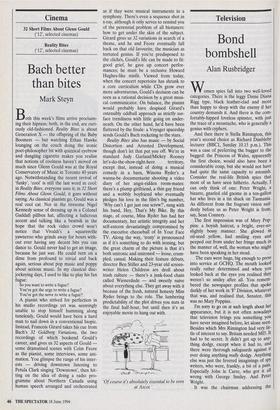Cinema
Reality Bites (`12', selected cinemas)
Bach better than bites
Mark Steyn
Both this week's films arrive proclaim- ing their hipness; both, in the end, are curi- ously old-fashioned. Reality Bites is about Generation X — the offspring of the Baby Boomers — but watching Ethan Hawke lounging on the couch doing the ironic poet-philosopher bit with quizzical eyebrow and dangling cigarette makes you realise that notions of coolness haven't moved on much since Glenn Gould was at the Royal Conservatory of Music in Toronto 40 years ago. Notwithstanding the recent revival of `funky', 'cool' is still the last word in cool: in Reality Bites, everyone uses it; in 32 Short Films About Glenn Gould, it goes without saying. As classical pianists go, Gould was a real cool cat. Not in the tiresome Nigel Kennedy sense of dressing up in a Colonel Gaddafi pillbox hat, affecting a ludicrous accent and talking like a beatnik in the hope that the rock video crowd won't notice that Vivaldi's a squaresville yawneroo who grinds away for hours with- out ever having any decent bits you can dance to. Gould never had to get an image, because he just was. He could turn on a dime from profound to trivial and back again, serious about pop music and poppy about serious music. In my classical disc- jockeying days, I used to like to play his fun fugue:
So you want to write a fugue?
You've got the urge to write a fugue?
You've got the nerve to write a fugue?
A pianist who strived for perfection in his studio recordings yet was seemingly unable to stop himself humming along tunelessly, Gould would have been a hard man to nail down in a conventional biopic. Instead, Francois Girard takes his cue from Bach's 32 Goldberg Variations, the two recordings of which bookend Gould's career, and gives us 32 aspects of Gould some dramatised scenes with CoIm Feore as the pianist, some interviews, some ani- mation. You glimpse the range of his inter- ests — driving downtown listening to Petula Clark singing 'Downtown', then hit- ting on the idea of doing a radio pro- gramme about Northern Canada using human speech arranged and orchestrated as if they were musical instruments in a symphony. There's even a sequence shot in x-ray, although it only serves to remind you of the perennial problem of all biotuners: how to get under the skin of the subject. Girard gives us 32 variations in search of a theme, and he and Feore eventually fall back on that old favourite, the musician as tortured genius. If you're predisposed to the clichés, Gould's life can be made to fit: good grief, he gave up concert perfor- mances; he must be a reclusive Howard Hughes-like misfit. Viewed from today, when the concert repertoire has shrunk to a core curriculum while CDs grow ever more adventurous, Gould's decision can be seen as a rational decision by a great musi- cal communicator. On balance, the pianist would probably have despised Girard's ostensibly oddball approach as strictly sur- face trendiness with little going on under- neath. On the other hand, he'd have been flattered by the finale: a Voyager spaceship sends Gould's Bach rocketing to the stars.
Reality Bites also has music — by Social Distortion and Arrested Development, though don't let that put you off. We're in standard Judy Garland/Mickey Rooney let's-do-the-show-right-here territory, except that, instead of doing a musical comedy in a barn, Winona Ryder's a wanna-be documentarist shooting a video diary of her angst-ridden room-mates: there's a plump girlfriend, a thin gay friend and a wobbly boyfriend who eventually pledges his love in the film's big number, `Why can't I get just one screw?', sung with his band, Hey, That's My Bike. By this stage, of course, Miss Ryder has had her documentary, her artistic integrity and her self-esteem devastatingly compromised by the executive cheeseball of In Your Face TV. Along the way, 'irony' is pronounced as if it's something to do with ironing, but the great charm of the picture is that it's both unironic and unironed — loose, crum- pled, casual. Making their feature debuts, director Ben Stiller and 23-year old screen- writer Helen Childress are droll about trash culture — there's a junk-food chain called Wienerdude — and sweetly naive about everything else. They get away with it because of the fresh, natural honesty Miss Ryder brings to the role. The lumbering predictability of the plot drives you nuts in the final half-hour, but until then it's an enjoyable movie to hang out with.
'Of course it's absolutely essential to be seen at Ascot.'


























































 Previous page
Previous page